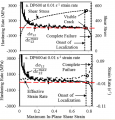Dynamic Considerations in Prediction of Fracture of Ultra High-Strength Steel During Crash
- 2018-10-16 10:56:00
- LUQIMENG Original
- 3509
High strain rate response of automotive alloys (tensile + shearcharacterization):
1、DP980 (SMDI), DP600
2、Fully quenched Usibor® 1500-AS, Ductibor® 500-AS
Effect of strain rate on fracture?
1、Shear conditions (zero triaxiality)
2、Positive triaxiality conditions
Weld failure characterization – “spot weld groups”
• Achieves shear strains easily on the order of unity with relatively constant triaxiality of zero .
• Appropriate for high rate testing in Hopkinson bar or high speed hydraulics (1-1000/s).
Issue today lies in the majority of fracture characterization for crash CAE being doneat quasi-static rates…
Potential sources of rate effects:
• Elevated strain rates
• Temperature increase through adiabatic heating (~90% of plastic work convertedto heat) *
• Inertial effects
• Rate sensitivity is initially positive, but becomes negative atlarge strains
• Promotes earlier localization under shear loading
• Onset of shear cracking is determined as the point where thehardening rate is exhausted 1
• Repeatable and eliminates the need to detect fracture based on visible cracking 2
In tension, positive rate sensitivity promotes higher failure strains as strain rate increases.
In shear, thermal localizationreduces failure strain (as measuredusing DIC) with increasing strain rate.
• Given the coarse meshesnecessitated in vehicle CAE, failurestrains should be measured using alength scale on the order of theelement size
• DIC virtual strain gauge length: 0.3mm) versus 3-5 mm element size
• For these materials, shear strain tofailure input to FEA decreases withstrain rate!
• Less impact on positive triaxialityregime, however, confoundingresults exist in the literature
• Earlier localization,narrower thermal fieldfor the higher strengthconditions
• Thermal localizationenhanced for higherstrength alloys
• The strong workhardening of the DP600is clearly beneficial
• Interaction between nugget, HAZ and parent metal strength(single weld)
• Test method for weld group testing (Mode I Caiman)






















